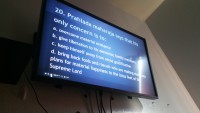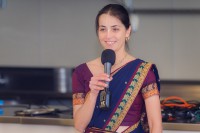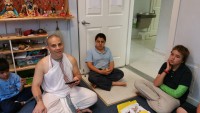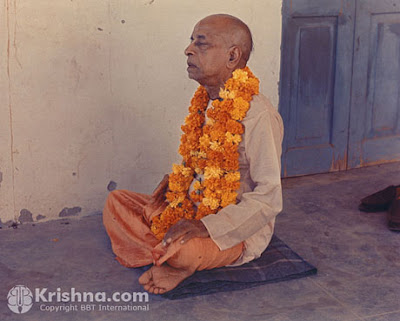On 11 June 2015, Kadamba Kanana Swami presented a lecture at the Chinese Sanga at Reading University, in England. Sadly, no audio recording was captured but here is an elaborate description.
By Bhakta Nandan
Maharaj started off with a quote from social anthropology about the human personality being composed of nature and culture,
Nature is deep within us, whilst culture is something we grew up with. Culture has many functions, it is meant for cultivating certain qualities and avoiding certain qualities. In this way, the world has culture in which humans find shelter and protection. The ancient cultures, including Indian and China, were of a deeper nature with more emphasis on values; whereas the modern cultures are based on, ‘When’s the money coming?’
A few of the Chinese women were nodding their heads, seemingly in agreement, although one could have also considered it as some form of cultural etiquette. Saying that, they were diligently taking notes… more so than probably a lot of devotees do!
Maharaj continued with how he got involved with India forty-five years ago. Then, India was a completely different world from where Maharaj came from but of course, in the modern times, the world is getting very small. Maharaj then pointed to a young European lady in the audience. He mentioned how last week he met this same lady in Australia and now he is here and she is here too! The Chinese women started giggling at this remark. It is interesting how people from different cultures find completely different things funny.
 Anyhow, Maharaj went on to say that now it is normal to chat with someone fifteen thousand miles away, but for all the miracles of technology, we pay a price. We experience this on a social level. Things are getting lost. Traditions are disappearing, little-by-little.
Anyhow, Maharaj went on to say that now it is normal to chat with someone fifteen thousand miles away, but for all the miracles of technology, we pay a price. We experience this on a social level. Things are getting lost. Traditions are disappearing, little-by-little.
Now, China is opening up to the world at large and with that, gradually there will not just be a business relationship with the West, there will be a cultural one as well. Soon, it will merge into one standard and this will be of a thoroughly materialistic nature. With that, there will be emptiness; a global village haunted by a ghost of emptiness. A deeper fulfillment will be missing.
However, Maharaj did reassure the audience that there is a solution to all this – by reconnecting with ancient cultures, it will give us new inspiration. He then gave an example from his own life. He was from Holland which was greatly affected by the war. The mood after the war was all about rebuilding the nation and then the whole focus was on economy and profit. In twenty years, Holland became a successful nation. But by that time, Maharaj’s generation were not just children. They were asking whether it is just about the economy or was there not more to life?
Many groups were coming out, such as the Beatles, who had a song called, “She loves you, yeah, yeah, yeah!” This was the reason the kids bought it. But on the other side, there was a song called, “Money can’t buy you love.” This really made the youth feel connected to an ancient culture. So the point is that we have so many emotions, but the central theme of love in Vedic culture is “give, give, give.” In love, there is greater pleasure in giving than taking.
This spirit of loving and giving is the sublime and topmost element of emotions and the essence of the Vedic culture – bhakti. The root (dhatu) of this word is bhaj which means service, love and worship. So life is not just about economic development. Maharaj pointed out that this is the humanities faculty, “Is it just to get a buck or do we actually want to do something good for humanity?”
Otherwise everyone just cares about themselves and not others. So Vedic literature says that if you want to change the world, then change yourself. The emphasis is on individuals making differences in their character. In humans, we recognize higher and lower natures within. Vedic literature is all about pursuing the higher nature of the individual.
If you just proclaim good values, like the value of honesty, but if no one in the room is honest, what is the point? So we must first cultivate good values. In the long term, this brings out the good results. So we must look at the long term then things will be more balanced.
Maharaj emphasized that we must look at where things come from. Modern society tells us that the oceans and heat together are creating things but it has never been observed that anything ever came to life from something dead.
In Holland, the culture is liberal – so long as you do not talk about religion. However, we must understand somehow that there is a divine being! In India, there is still something. The day after the tsunami, there was a global outcry but that did not break the spirit of the Indians. They were just like, “It is alright. We can deal with it.”
 Maharaj then remembered how he was in Benares where there many beggars. One morning, he saw a dead body lying on the street. Many people were walking passed it and chucking coins. Soon the whole body was covered in coins and Maharaj asked why. One of the locals mentioned it was to buy wood to burn the body. This it was to help the soul not come back to that body again. In Vedic culture, the body is burned because the soul still wants to get back into the body. Bodies are yantras or machines. We are actually not this body. That is the essential truth. The soul is constantly changing according to consciousness. Noting the Chinese crowd, Maharaj added how it is the same in Buddhism; after all it came from India. So bodily consciousness determines what we become.
Maharaj then remembered how he was in Benares where there many beggars. One morning, he saw a dead body lying on the street. Many people were walking passed it and chucking coins. Soon the whole body was covered in coins and Maharaj asked why. One of the locals mentioned it was to buy wood to burn the body. This it was to help the soul not come back to that body again. In Vedic culture, the body is burned because the soul still wants to get back into the body. Bodies are yantras or machines. We are actually not this body. That is the essential truth. The soul is constantly changing according to consciousness. Noting the Chinese crowd, Maharaj added how it is the same in Buddhism; after all it came from India. So bodily consciousness determines what we become.
One time a Professor introduced Maharaj as a reincarnationist. Maharaj emphasized that he is not a reincarnationist. It is a risky business. We do not know where we will end up. So as long as we want to control and possess (in a mocking German accent), “This is mine! That is mine! This is mine!” Then hate, lust, greed always comes back to us. “Here is my lovely baby. The neighbour’s baby – go away. Korean child – bad. Chinese child – good!”
A saint can embrace the whole world, by going for higher values. For example, they put Mandela in prison for twenty seven years but he came out without any hate! How do we reach this? Through meditation? However, it is very difficult to focus the mind. We are spiritual beings connected to each other and are meant to serve, love and worship; and that is the best way to attain that state of consciousness.
Throughout the whole talk, one could barely hear a pin drop from the Chinese ladies, but as soon as Maharaj mentioned that it was time for questions, a whole host of hands went up and a very lively and animated discussion ensued. One of the ladies asked Maharaj, “What, in your opinion, is the meaning of being human?”
Maharaj firstly asserted that his opinion is the Vedic culture, which he puts faith in. Without principles, humans are like animals. But humans can have the element of spirituality to recognize the Lord and help in the elevation of all. That is human, otherwise it is anti-human. If you do not have spiritual goals, then you are like an animal!
Another lady asked, “Why is it that people are still miserable despite rising standards of living?”
Maharaj replied that there are people who are exploiting; the profit just stays with the bosses. For example, recently in a magazine on the plane, it was revealed that Suharto of Indonesia had amassed a whopping fifty-nine billion dollars for himself that was meant for the citizens of his nation. These things are to be expected. Lust, greed, anger become the predominant qualities so we need to go for higher qualities.
The same lady then asked, “How does one restore oneself to the good side?”
Maharaj explained that this is done by long term vision. If we act for the evil side, we may get immediate benefit. We must act in reference to the long term benefit through education and training. We can choose the good option again and again. If our long term vision is strong, then we are able to say no.
The questions kept coming, one after another. It was fascinating to see how these Chinese women had transformed from the dour, sober group during the talk to really going for it and inquiring as much as possible about the ins-and-outs of Maharaj’s discussion.
The last two questions to Maharaj are particularly worth mentioning. One of the ladies asked Maharaj, “How do you get the strength to do this?”
Maharaj responded quite simply that if you are in a group that commits to a goal, then you can do it – like giving up smoking. Of course, in the initial stage, some level of determination is definitely required as well. Maharaj went on to say that after the war, his uncle and father were enjoying the fruits of their hard work. There were four boys, including cousins, and he was chosen as the leader because he had a brain for these things. However, he saw that his father was not happy and was always working so he told him he did not want to work in the company. As expected, his father became livid and threatened that he would not give him a single cent. That is when Maharaj knew that he did not need it. His father then realized that he had no control over his son. Maharaj left for India at age seventeen, with the belief that he also had enough energy to make his own money, but his mother ended up giving him money anyway! (Laughter from audience) Maharaj explained how his father had a textiles factory and daily he saw so much wool coming in to be made into carpets and yet there was so much blood on the wool. Why? What is going on? His father also taught him how to the read the wine chart so he could wine and dine. So this was the culture that Maharaj was brought up in.
At the end of the class, the final question to Maharaj was rather funny. One of the ladies asked why did Maharaj have a Chinese surname.
It goes without saying that this question did bring forth a few chuckles from those assembled. For those of you who don’t know, Maharaj’s birth surname is Kok. Maharaj said how he was in Canada at the time of the SARS virus so his name came up on the computer. The airport official looked at the name and was a little perplexed. Here was Maharaj, by all accounts having very North European features but with a dhoti andchadar and a name like Kok. Somehow, the official concluded this gentleman must be in Chinese and so they kept him in custody! (Further laughter)
Maharaj then finally clarified that Kok is also a Dutch surname meaning ‘to cook’. The Chinese lady then responded by saying that Kok in Chinese is related to castles. Maharaj then thought for a while and with a grin stated that he preferred the Chinese definition for his name! The Chinese ladies then all laughed in appreciation.
Maharaj then finished off with a sweet melodic, low-key kirtan – just right for the mood and audience.




 Kirtan with Hladini Kirtan Band at your home
Kirtan with Hladini Kirtan Band at your home Sunday School
Sunday School Gift Shop
Gift Shop



 Gopi Vallabhi Mataji arrived ready with a Jeopardy style game, testing the student’s prior knowledge on Lord Nrsimhadeva! The children had much fun answering questions in their teams and scoring points. “Prahlad Maharaj says that his only concern is to: a. overcome material existence. b. give liberation to his demoniac friends. c. keep himself away from sense gratification. or d. bring back the fools and rascals who are making elaborate plans for material happiness.” Do you know the answer?
Gopi Vallabhi Mataji arrived ready with a Jeopardy style game, testing the student’s prior knowledge on Lord Nrsimhadeva! The children had much fun answering questions in their teams and scoring points. “Prahlad Maharaj says that his only concern is to: a. overcome material existence. b. give liberation to his demoniac friends. c. keep himself away from sense gratification. or d. bring back the fools and rascals who are making elaborate plans for material happiness.” Do you know the answer?



 Next, the study of mothers, leading up to Mother’s Day. Mother Nrtya Kisori spoke about the importance of respecting women in Vedic culture.
Next, the study of mothers, leading up to Mother’s Day. Mother Nrtya Kisori spoke about the importance of respecting women in Vedic culture.





















